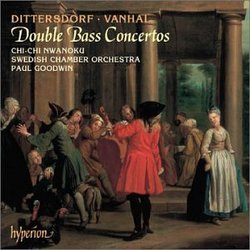| All Artists: Karl Ditters von Dittersdorf, Johann Baptist Vanhal, Paul Goodwin, Svenska Kammerorkestern, Chi-chi Nwanoku, Swedish Chamber Orchestra Title: Double Bass Concertos Members Wishing: 1 Total Copies: 0 Label: Hyperion UK Release Date: 1/9/2001 Album Type: Import Genre: Classical Styles: Chamber Music, Forms & Genres, Concertos, Historical Periods, Classical (c.1770-1830), Instruments, Strings Number of Discs: 1 SwapaCD Credits: 1 UPC: 034571171791 |
Search - Karl Ditters von Dittersdorf, Johann Baptist Vanhal, Paul Goodwin :: Double Bass Concertos
 | Karl Ditters von Dittersdorf, Johann Baptist Vanhal, Paul Goodwin Double Bass Concertos Genre: Classical |
Larger Image |
CD Details |
CD ReviewsNwanoku's playing is both athletic and eloquent in these app R. Robbins | 12/29/2007 (4 out of 5 stars) "Nwanoku's playing is both athletic and eloquent in these appealing bass concertos Possibly the double bass, as solo instrument, doesn't always bring out the very best in a composer. The Vanhal concerto here lacks the energy of his recently recorded symphonies and the refinement of his recently recorded quartets; the musical invention in the outer movements is rather thin and conventional, although not without touches of wit. But the central Adagio has a certain warmth and gentle expressiveness that is quite attractive. Chi-Chi Nwanoku, who concertgoers will know as the energetic underpinning of the Orchestra of the Age of Enlightenment and other groups, plays her solo music with due vivacity and skill, and with some nice touches of timing, while in the slow movement she is as graceful as can be imagined on her instrument. The works here are played in complete, original form, not in the usual bowdlerised versions designed to make them amenable to a modern double bass; Nwanoku tunes her instrument in late 18th-century Viennese fashion, not in modern fourths (the only difference is that she does not tune it up a semitone, as was often done then - as in the viola part of Mozart's K364 Sinfonia Concertante - to lend it extra prominence; that means that the orchestra here plays in D rather than E flat). The restoration of the original text seems to be particularly significant in the Dittersdorf works, which often experiment with sonorities - No 1 especially, where there are passages in the outer movements with the bass scrubbing away in its bottom register while the oboes sustain high notes: a very odd effect. Dittersdorf is ingenious in his solo writing, and even if the actual ideas here too are quite slender, there is plenty to enjoy in the double bass's gymnastics in the lively and cheerful quick movements. Nwanoku plays them admirably and finds as much eloquence in the slow music as you can readily imagine on the double bass. As a bonus there is an extra performance of the first movement of No 1 with her own, slightly longer and even more athletic cadenza in place of the one by J M Sperger, a contemporary of the composers, who (probably) supplied the remaining cadenzas on the disc. Paul Goodwin's neat and sympathetic accompaniments, his leisurely pacing and his judicious balance, with quite prominent wind, make this disc even more appealing to anyone susceptible to the instrument's gruff charms. " Wasn't planning on writing a review of this, but... Wayne A. | Belfast, Northern Ireland | 02/20/2010 (5 out of 5 stars) "The reviewer, proper, here says just about anything I could have said about this recording of rare and revealing works. The one-star reviewer (who wrote only three one-line reviews for Amazon, possibly as some grammar school project) has brought the rating of this fine disc down to an absurd and unjustifiable level. Man, sometimes the whole Amazon review process burns me up.
So here's five stars for what I would have given four stars, to make up for the ridiculous one-star review." |
